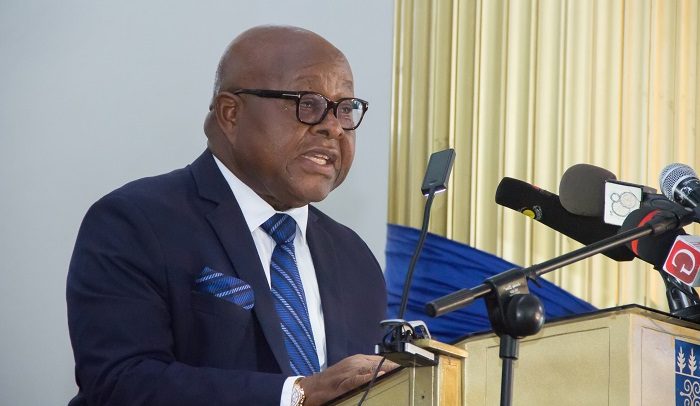Speaker Prof. Mike Oquaye
This year’s New Year School and Conference at the University of Ghana was opened yesterday by the Speaker of Parliament, Prof Mike Oquaye, with the first day focusing on building strong institutions for democratic consolidation in Ghana.
The four-day New Year School and Conference, which is being attended by participants from public and private institutions, has “Building Strong Institutions for Democratic Consolidation in Ghana” as its main theme.
Speaking on the main theme for this New Year’s School yesterday, Prof Joseph Atsu Ayee of the Political Science Department of the University of Ghana, who was also the guest speaker on the opening day, said that the framework of the 1992 Constitution, socio-political orientation of Ghanaians and extreme partisanship and polarization in Ghana’s politics endanger public institutions and undermine their efficiency and effectiveness.
According to Prof Atsu Ayee, the overbearing powers given to the president under the 1992 Constitution, which allow him to create parallel institutions to the existing ones under the constitution, continue to affect the consolidation of democracy and good governance in the Fourth Republic.
He said institutional paralysis has been created under the Fourth Republic by further fragmentation of existing institutions by the governing authorities.
He said there are no effective checks and balances under the 1992 Constitution, resulting in weak state administrative capacity.
The Professor cited the Electoral Commission (EC) and the Bank of Ghana (BoG) as two important state institutions whose weak regulatory roles have resulted in political tension in the country and chaos in the banking sector.
He, therefore, advocated the re-orientation of Ghanaians towards public work to tackle corruption and overhaul the 1992 Constitution.
He could not fathom why the state could spend a staggering amount of $6.3 million to set up a Constitution Review Commission under the former President Prof Mills’ administration to recommend some proactive changes in the 1992 Constitution of the Fourth Republic but those recommendations had been ignored.
He said 97 amendments were proposed to be made to the 1992 Constitution; 41 are for the entrenched provisions and 56 for the non-entrenched provisions to help strengthen public institutions and enhance checks and balances.
Prof Atsu, therefore, appealed to parliament to push for the adoption of those 97 amendments to the Constitution or initiate four out of the five major amendments to the 1992 Constitution.
The Speaker of Parliament, Prof Oquaye, who officially opened the New Year School, said he has always been worried about the excessive executive powers given to the President under the 1992 Constitution, stressing that the powers given to the President to appoint at least 50% of his ministers from Parliament does not augur well for the effective oversight responsibility of the legislature.
He also said that the nation must make conscious effort to give a lot more opportunities to women, especially at the governance level since they are not easily susceptible to corrupt practices.
The speaker asked political parties and political actors to identify some constituencies that could only be contested by women parliamentary candidates to boost their participation in politics.
He also suggested to the government to ensure that a third of its appointees to the various district assemblies are women.
During the four-day New Year School, topics such as ‘The Judiciary and Democratic Consolidation,’ ‘Strengthening Anti-Corruption State Institutions’, ‘Investigative Journalism, Corruption and Sustainable Development’, ‘Political Vigilantism and Ghana’s Democracy’ and ‘Effective Legislative Oversight for Countervailing Authority would be covered.
By Thomas Fosu Jnr


